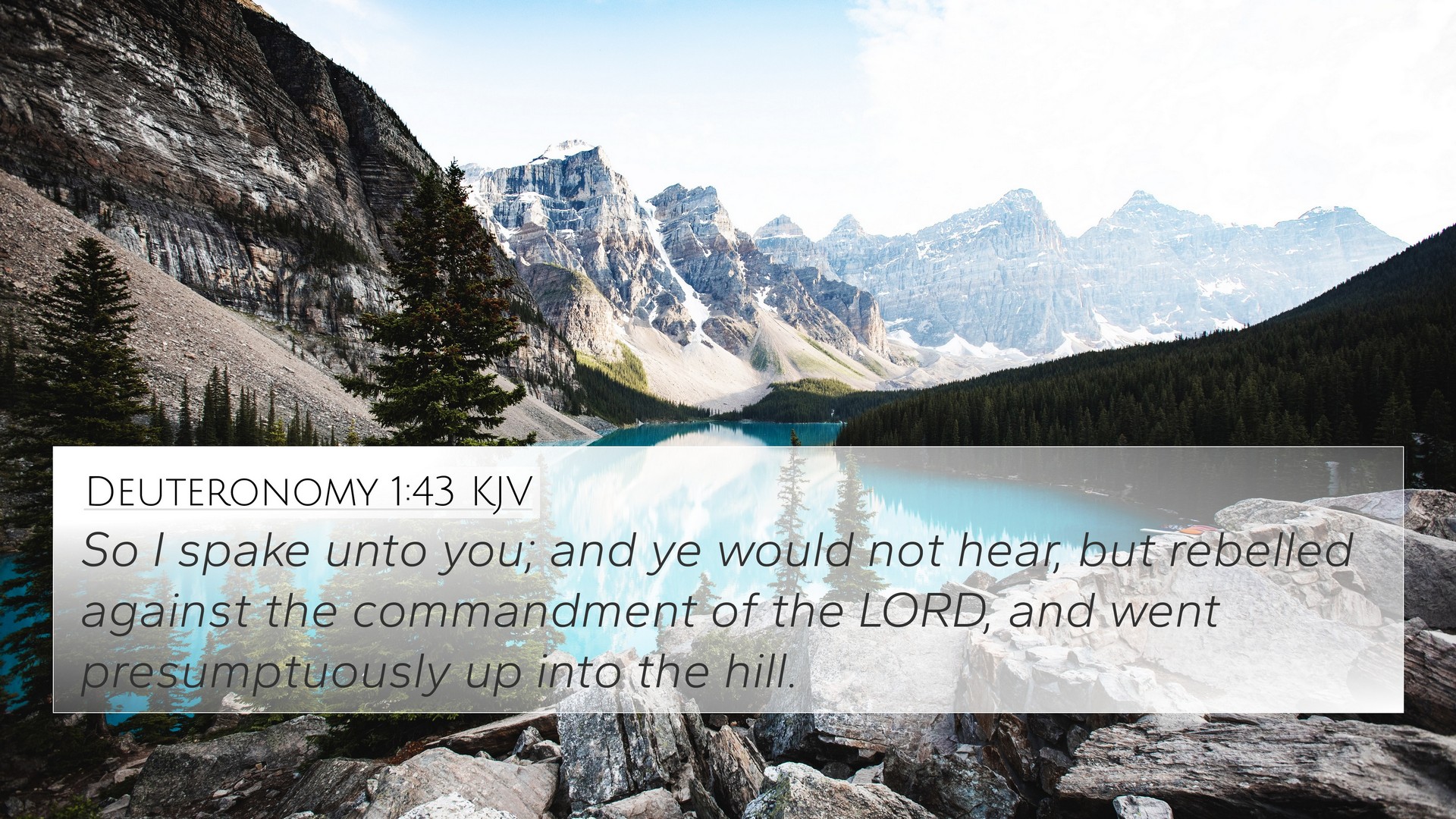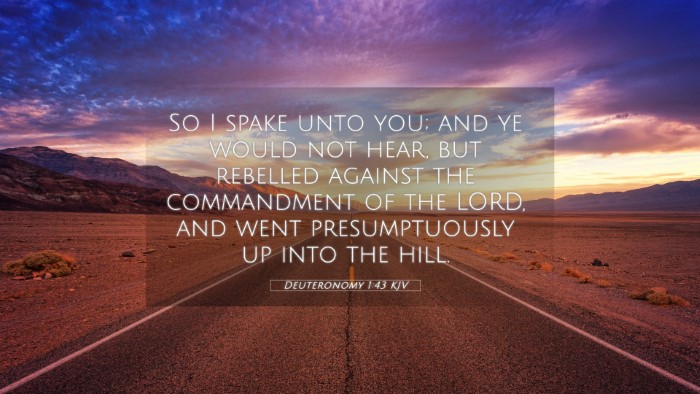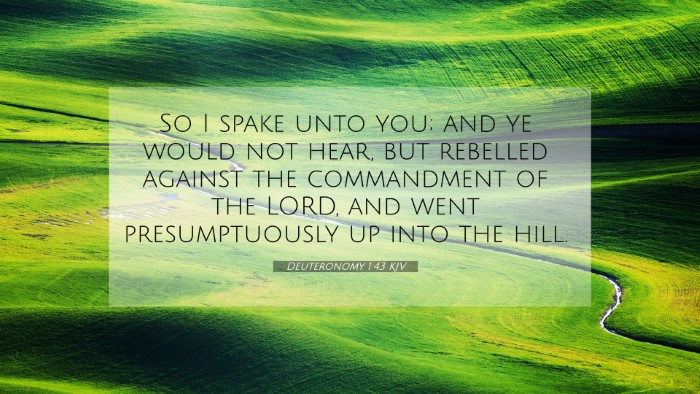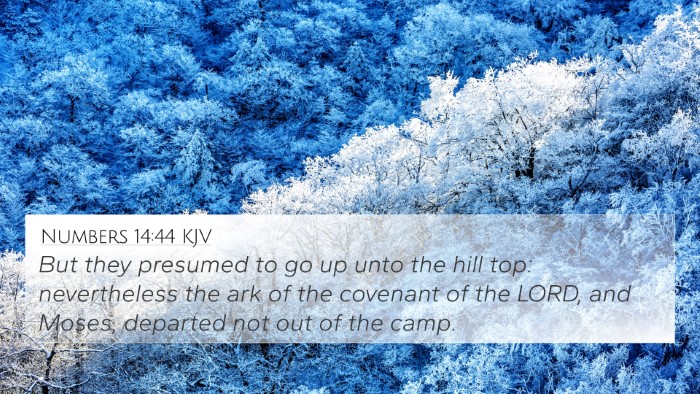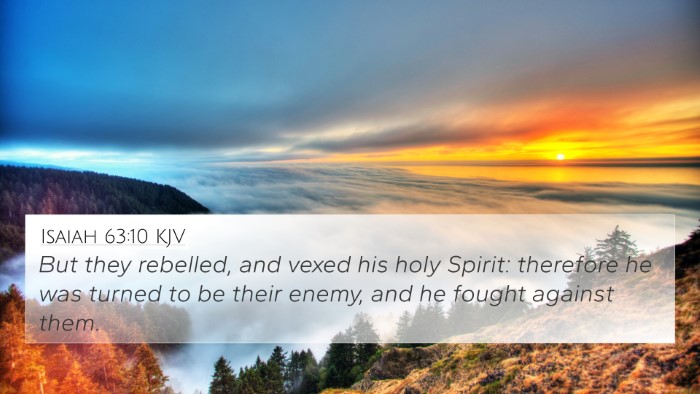Meaning and Interpretation of Deuteronomy 1:43
Deuteronomy 1:43 states, "So I spoke unto you; and ye would not hear, but rebelled against the commandment of the Lord, and went presumptuously up into the hill." This verse captures a essential moment in the history of Israel, reflecting themes of disobedience, rebellion, and the consequences of neglecting God's guidance.
Summary of Insights from Public Domain Commentaries
This verse has been examined in depth by various biblical commentators. Here, we compile insights from prominent scholars like Matthew Henry, Albert Barnes, and Adam Clarke to shed light on its meaning and implications.
Matthew Henry's Commentary
Matthew Henry emphasizes the consequences of rebellion and disobedience. He highlights that the Israelites were warned about the seriousness of their actions. Their refusal to listen and their presumption in approaching the hill reflect a grave overstepping of bounds set by God. Henry notes that sin leads to a downfall, reminding readers that divine commandments are not to be disregarded.
Albert Barnes' Commentary
Albert Barnes focuses on the historical context of the verse. He reminds us that this event followed the refusal of Israel to enter the Promised Land after hearing the negative report from the spies. Barnes points out that their attempt to ascend the hill without God's blessing was a direct act of rebellion. He also relates this action to the broader theme of God's patience and mercy in the face of human obstinance.
Adam Clarke's Commentary
Adam Clarke provides a more detailed examination of the Israelites' mindset. He explains that their presumptuous act was a misguided attempt to prove their courage and faith after being discouraged. Clarke notes that this event serves as a warning: attempting to fulfill God’s promises without His command leads to certain failure and danger.
Thematic Analysis and Connections
This verse is rich in themes relevant not only to the Old Testament but also to various concepts across the entire Bible:
- Rebellion Against God: Deuteronomy 1:43 reflects the broader biblical theme of the consequences of turning away from God’s commands (see Romans 1:28-32).
- Presumption: The Israelites’ presumptuous actions parallel other biblical figures who acted without divine direction (such as Saul in 1 Samuel 13:8-14).
- Warnings Against Disobedience: The New Testament echoes these sentiments, particularly in Hebrews 3:12-15, which warns against hardening one’s heart.
- God’s Patience: Despite their disobedience, God’s enduring patience is reflected in 2 Peter 3:9, where it is stated that God is not willing that any should perish.
Cross-References for Deuteronomy 1:43
Understanding Deuteronomy 1:43 benefits from examining inter-Biblical connections. Here are several cross-references:
- Numbers 14:41-42: The direct account of the Israelites' rebellion and defeat.
- Hebrews 4:1-2: A warning against disbelief and disobedience.
- 1 Samuel 15:23: Comparing disobedience to divination and idolatry.
- James 1:22: The importance of not just hearing the word but doing it.
- Matthew 7:21: Actions are aligned with true devotion to God.
- Proverbs 29:1: The dangers of hardening one’s heart against correction.
- John 14:15: Jesus’ emphasis on obedience to His commandments.
Practical Application
For modern readers, Deuteronomy 1:43 serves as a potent reminder of the serious nature of God’s commands, encouraging a faithful and humble spirit. In studying this verse, one gains insight into biblical principles of obedience and the dangers inherent in self-reliance and rebellion against divine counsel.
Conclusion
In conclusion, Deuteronomy 1:43 offers a rich tapestry of meanings rooted in the themes of rebellion, disobedience, and the consequences of ignoring God's word. By engaging with cross-referenced scriptures and examining the collective insights from renowned biblical commentators, readers can deepen their understanding of this verse and its application to their lives today.
